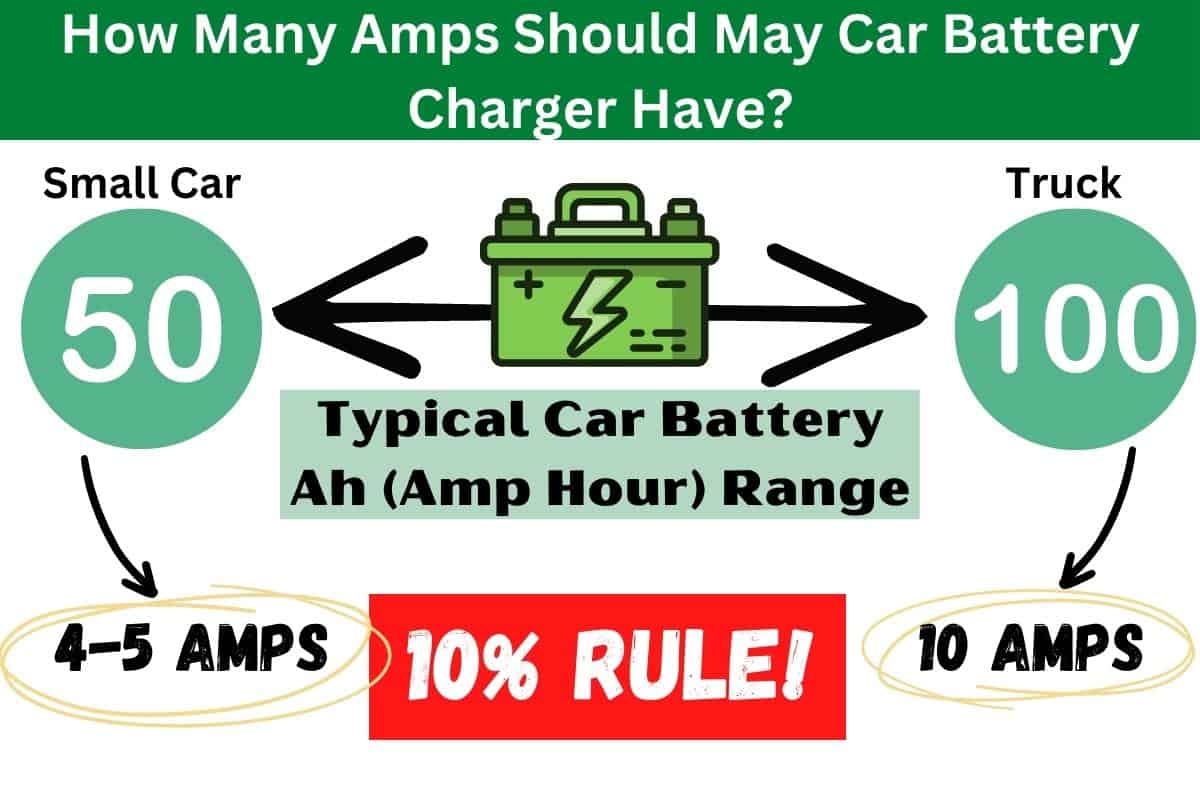When your car battery dies and you need to select a charger, it is easy to be overwhelmed by all of the choices with regard to the different amp ratings. 1 amp trickle chargers, 5-amp float chargers, 15-amp fast chargers, etc. The choices seem endless!
Let’s sift through the mud and quickly show you what you’ll need to make a quick but informed decision. I’m assuming you’re standing in the store aisle and don’t have all day.
How Many Amps Should May Car Battery Charger Have?
Most car batteries fall between 50 and 100 amp hours (Ah) in equivalency. The general rule of thumb is to not use a charger with amps that exceed 10% of your battery’s total Ah rating. Therefore, a safe car battery charger will be anywhere from 5 to 10 amps.
A charger with 5-amps is an all-around MVP for car batteries. It’ll charge your car’s battery gently so as to reduce the chance of overcharging at any point in the process, but it will also do it fast enough to charge nearly all car batteries overnight from empty if you really had a dead battery.
In other words, if you have a small capacity car battery, 5-amps will be perfect. If you have a higher capacity battery, the 5-amp charger will still work great.

The charger I’ve used for years is from Deltran and is known as a Battery Tender. I have a 4-amp charger (Amazon) but only because the 5-amp chargers were not available when I made my purchase. This charger has worked for me for years and I’ve used it on a daily basis to top off my car batteries once a month and to serve as a float charger for my emergency battery bank. This brand makes quality chargers.
*At the time this article was written in 2022, the difference in price between the 4-amp charger and the 5-amp charger on Amazon is more than double and I cannot recommend the 5-amp when you consider the return on investment. The difference in charge times will be negligible for most applications and doesn’t warrant the extra money. Stick with the 4-amp until the prices are more comparable.
If you choose a charger with more than 10-amps, you risk overcharging it while the battery is charging since the capacity of a car battery isn’t all that high in relation to the amps being delivered by the charger.
Batteries can only convert electrical energy into stored chemical energy at a certain rate. If your battery cannot convert the amps from a higher rated charger fast enough, then your battery runs the risk of bubbling, boiling out the electrolyte, and smelling like rotten eggs. None of these are good and can lead to premature death or reduced capacity to your battery.
Selecting a charger that is conservative in size but might take a little longer to charge is preferable to selecting one that will cook your battery — especially if are not in a hurry. Since charging a battery overnight is a common thing to do, 5-amps would be perfect.
Be cautious with going too low with regards to the amps of a charger if you’re looking for a “trickle charger”. For car, SUV, truck, and marine batteries, it is best to not go any lower than 2-amps. The problem with going too low is that many modern chargers will time themselves out after a certain amount of hours and your battery may never even get close to being fully charged since the amps are so low.
How Long Will It Take to Charge My Car’s 12-Volt Battery?
A properly sized car battery charger (5-10 amps) will charge a typical car battery (70Ah) at 50% state of charge in about 5 hours or a completely dead battery in 10 hours.
Generally speaking, a battery charger will replace 90% of its advertised amp output towards the battery’s depleted amp-hour (Ah) capacity per hour. So, if you had a 100 Ah battery that was at 12.1-volts (50% capacity), and you had a 10 amp charger, you’d be looking at about 5.5 hours until your battery was charged.
50Ah to be replaced / (10-amp charger * 0.9) = 5.55 Hours of charge time
Here’s a table below which will give you ballpark estimates of charge times based on your car battery’s size and current voltage. Go ahead and check the sticker on your battery to see which size category it falls in.
Batteries with Ah: 36-46.2, CCA 200-315, or RC 40-60:
| Charging Amps | 50% Starting Charge (12.1v) | 0% Starting Charge (10.5v) |
|---|---|---|
| 5 | 5.25 Hours | 10.5 Hours |
| 8 | 4.25 Hours | 8.5 Hours |
| 10 | 3.25 Hours | 6.5 Hours |
Batteries with Ah: 46.2-58.8, CCA 315-550, or RC 60-85:
| Charging Amps | 50% Starting Charge (12.1v) | 0% Starting Charge (10.5v) |
|---|---|---|
| 5 | 6.5 Hours | 13 Hours |
| 8 | 4.25 Hours | 8.5 Hours |
| 10 | 3.25 Hours | 6.5 Hours |
Batteries with Ah: 58.8-111, CCA 550-1,000, or RC 85-190:
| Charging Amps | 50% Starting Charge (12.1v) | 0% Starting Charge (10.5v) |
|---|---|---|
| 5 | 11 Hours | 22 Hours |
| 8 | 6.5 Hours | 13 Hours |
| 10 | 5.25 Hours | 10.5 Hours |
